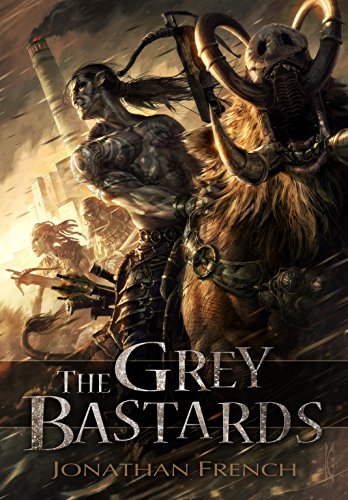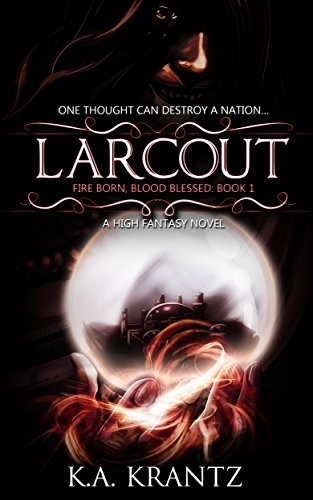In Mark Lawrence‘s Self-Published Fantasy Blog-Off, ten SFF review blogs joined forces to read 300 self-published fantasy novels. Each blog read ten books and chose one to advance to the top ten. The book that we advanced was Kaitlyn Davis‘s The Shadow Soul (here’s our review) and we gave it a score of 5 out of 10 on Lawrence’s scale. We reviewed four of the finalists back in March and this post contains our last batch of reviews. Thanks for joining us on this quest, and thanks to Mark Lawrence for such a fun contest! We’d like to congratulate the winning book: The Grey Bastards by Jonathan French which Kevin reviews below. You can read all about the SPFBO and see the other blogs’ posts about it at Mark Lawrence’s blog.
 The Grey Bastards by Jonathan French (read by Kevin & Tadiana, given a score of 7, reviewed by Kevin):
The Grey Bastards by Jonathan French (read by Kevin & Tadiana, given a score of 7, reviewed by Kevin):
The Grey Bastards really shines with its plot: French does a decent job with the pacing, pulling you through the book with well-planned action scenes and moments of suspense. French slowly expands the scope of the novel as it progresses, and what begins as the story of a half-orc plotting to plotting to take control of his clan from an old clan leader becomes so much more than that. On the whole, The Grey Bastards reminded me a bit of Glen Cook’s The Black Company — though it isn’t nearly as depressing.
Where The Grey Bastards falls short, however, is its characters. To be fair, I’m glad that French chose to insert some moral ambiguity into his work so that there’s not a completely clear black-white good-evil distinction to be made for all the characters even if some of them are portrayed as unconditionally good or evil. However, The Grey Bastards needs to work a lot more on character development, especially for all the non-protagonists; a lot of them simply felt shallow or one-dimensional. Part of this may be the fault of the dialogue. Though the prose falls on the right side of acceptable, some of the dialogue is desperate for brushing up.
Overall, The Grey Bastards might be worth a read if you’re looking for something dark, gritty, and chock-full of fantasy tropes like orcs, elves, centaurs, weakling humans, and dark, dark magic. Many of the violence scenes can be pretty gruesome, and there is an inordinate amount of cursing involved throughout The Grey Bastards, so it’s definitely not a work for everyone. Personally, I think that if French had put some more thought into making The Grey Bastards more character-driven and worked on the worldbuilding and magic system more original, this book has the potential to be an 8.5 or even a 9. As it is though, The Grey Bastards is a 7 that has me on the lookout for some of French’s other works. ~Kevin Wei
 The Music Box Girl by K.A. Stewart (read by Katie, given a score of 6):
The Music Box Girl by K.A. Stewart (read by Katie, given a score of 6):
The Music Box Girl is an entertaining story with strong, likeable characters. The three protagonists offer a pleasing mix — the sensitive singer, Tony; the feisty blond, Bess; and mysterious Melody who haunts the Opera House in her dark cloak. The blossoming relationship between Tony and Bess is believable and not overly sentimental — plus it’s always nice to have a feisty heroine with a gun in her garter. The writing itself is also impressive, both simple and evocative, it is embellished to just the right degree.
There is a steam-punk edge to the setting — a Victorian-feel, coal-powered Detroit where horse-drawn carriages are being replaced by steam contraptions. There isn’t a great deal of scientific or technical explanation for this steam-powered world, the reader largely has to take it on trust that there are clever reasons why things work. (This didn’t bother me as I tend to tire of lengthy scientific explanations.)
Where the story does fall down is not in what it contains but rather in what is omitted. A real sense of danger is missing. This could have been heightened through a deeper exploration of Melody, who is by far the most complex and interesting character. Melody’s emotional state is too prone to change on a whim for a creature with a proven ability for deep introspection. The ghost of a child that follows her around, perhaps providing clues to her past, fails the spooky test, with Stewart relying on rather clichéd imagery: a dusty, abandoned bedroom; a rocking horse still rocking. A closer look at Melody’s relationship with Tony would also have helped bring that important bond to life; the reader is largely left out of their conversations in favour of Tony’s budding relationship with Bess.
The ending too is a little rushed. The characters concoct an evidentially foolish plan and Melody disappointingly relapses into selflessness having gone on a murderous rampage only moments before. Nevertheless I wanted to reach the end (in a good way) and I enjoyed the ride that got me there. ~Katie Burton
 Larcout by K.A. Krantz (read by Skye, given a score of 6):
Larcout by K.A. Krantz (read by Skye, given a score of 6):
The very first thing that struck me about Larcout, somewhat unfairly, were the many complicated names the reader is greeted with throughout the story. At times the naming practices began to make sense, only to have the main character thrust into an unfamiliar environment and new groups of people. Names like those in Larcout can help to flesh out a culture by illustrating important ties between characters. However, the sheer volume of people coming into and ducking out of the narrative served to heighten the complexity and confusing nature of the character names.
Part and parcel to the naming practices, there was an underlying cultural system. The echoes of a caste, class-based, or race-based system were ever present, without fully exploring the scope or implications of this system of oppression. While the system alluded to underlying historical biases, I always felt like it was somewhat under developed. In the end, I was still somewhat fuzzy on exactly how the strict hierarchical system worked.
Larcout would have benefited from slightly clearer evaluations of the stakes. Who is doing what and why? What are their motivations? While the sides of various arguments were outlined in many conversation, they were still very complicated and at times hard to follow. A little more insight into the various motivations would have strengthened the narrative and helped to bring me along with the stakes of the story. This aspect was aided by the very strong pacing of the story; however, I do think some revelations would have packed more of a punch with a little more clarity early on.
The strongest aspect of Larcout is its interesting main character. She is nasty, almost brutish, and thus a very different characterization of a god-like woman from anything I have read before. I am accustomed to seeing this kind of character being a sidekick, and so I greatly enjoyed having her as the focus. Her ruthlessness as a character trait is a vast departure from many of the leading ladies I’ve read before. I very much enjoyed this subversion of tropes and norms. Larcout illustrates that a ‘strong female protagonist’ has many meanings, and she doesn’t have to be likable to be powerful nor does she need to conform to be engaging and real.
I wanted to like Larcout more than I did by the end. It whisked me along with its strong pacing and interesting protagonist, but ultimately many other aspects of the story remain unclear to me which was a major drawback for my enjoyment of the story. ~Skye Walker
 Outpost by F.T. McKinstry (read by Skye, given a score of 4):
Outpost by F.T. McKinstry (read by Skye, given a score of 4):
There were strong aspects of Outpost that I enjoyed, and kept me reading. For instance, it has some characters that I liked digging in to, a good interesting helping of cosmic evil, and some satisfying mysteries. By themselves they made for some good reading, but in concert they didn’t quite mesh well for me.
Where some characters felt like they were well on their way to being fleshed-out people, many others felt pigeon-holed into their roles. Unfortunately, I felt like more characters fell into the second category. The stronger characterizations in contrast served to further illustrate the two-dimensional nature of the weaker ones. Overall, this dynamic distracted me from the story throughout the book.
The culture and landscape were both ambitious and somewhat confusing. The complexities of the plot in Outpost made for a few holes that I had a challenging time glossing over. Further, some of the prose in the descriptive passages became somewhat confusing, especially where physical landscapes were concerned. Taken all together these aspects made it difficult for me to stay in the narrative — I was often pulled out to re-read passages to make sure I was following the physical cues and plot developments.
Outpost utilized the show-don’t-tell style for much of the story, which I did like. However, it could use a little more polishing for some moments of confusing or clunky language that detract from scenes and muddy the overall picture.
Overall, there were admirable aspects of Outpost that I enjoyed reading. I’m a sucker for a couple good characters, and Outpost delivered a few I could get behind. The ambition of this story lies in its worldbuilding — something that I wished I could enjoy more. ~Skye Walker





Many thanks for taking part in the SPFBO, guys! Some great reviews.
Thanks, Mark — it was fun. Such a great contest!
Grey Bastards was a good time!